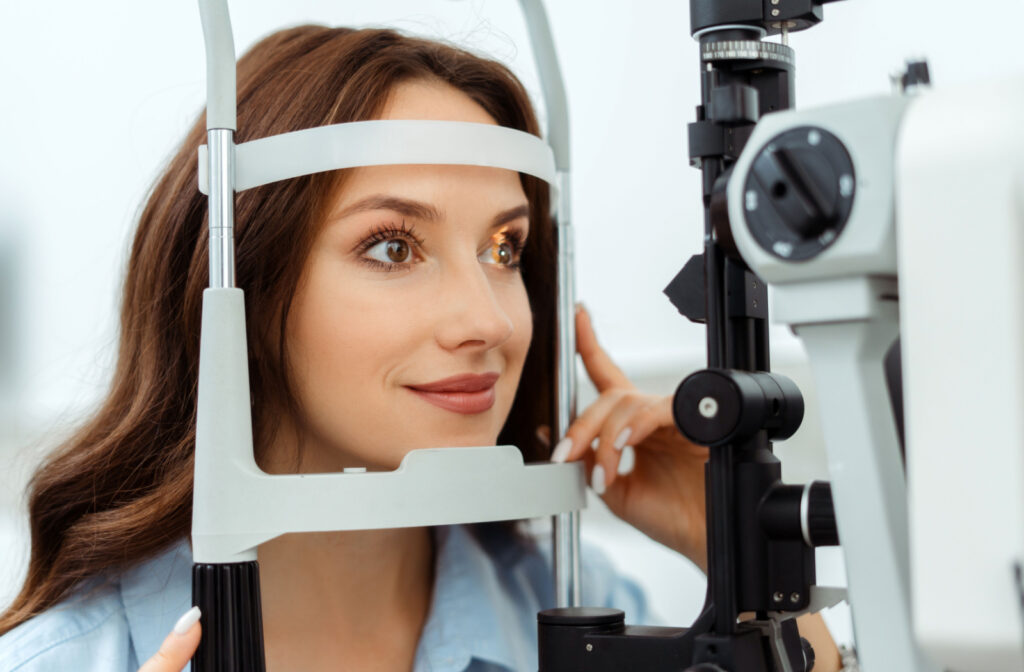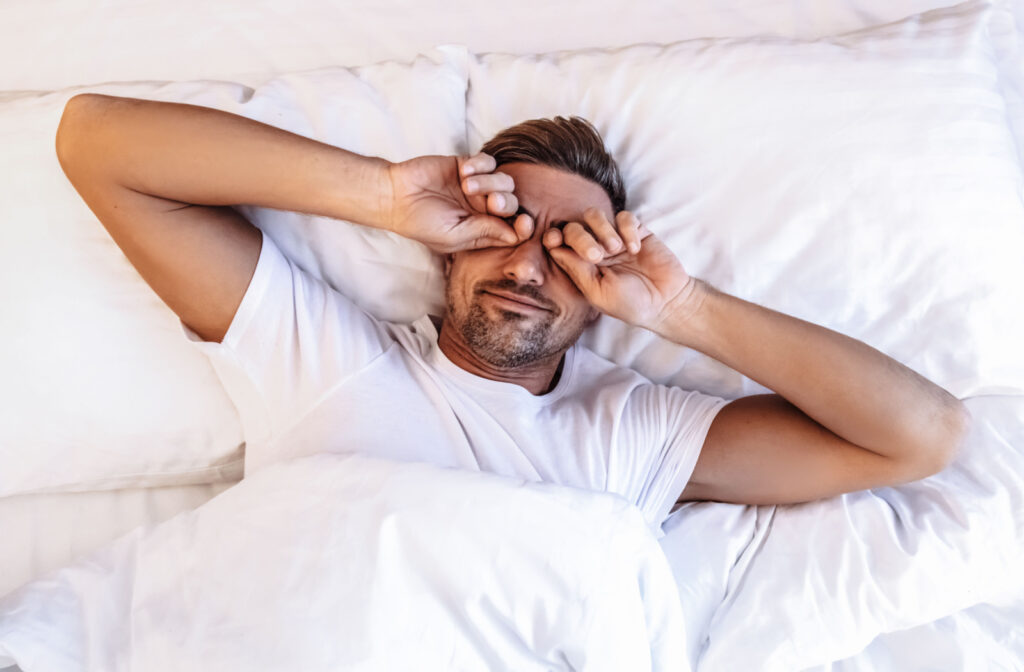Sleep should be a rejuvenating experience. If you’re waking up with dry, scratchy, or red eyes, it could be a sign that something’s off with your tear production.
Dry eye is a common condition that can be caused by a variety of things. If you find yourself consistently waking up with dry eyes, it could be due to:
- Poor quality tears
- Nocturnal lagophthalmos (eyes not closing)
- Medications
- Allergies
- A dry environment
The good news is that there are also many treatment options for dry eye. When you talk to your eye doctor about your symptoms, they can recommend treatments to help you wake up with comfortable, moisturized eyes in the future.
- Poor Quality Tears
The tear film, which covers the surface of your eyes, consists of 3 layers: the oily layer, the watery layer, and the mucous layer. Each layer has its own crucial role in keeping your eyes lubricated and comfortable. When any of these layers are compromised, it can lead to poor-quality tears and, consequently, dry eyes.
There are several reasons why the tear film might be affected. One common culprit is meibomian gland dysfunction, where the oil-producing glands in your eyelids become blocked or don’t produce enough oil. This can result in an insufficient oily layer, leading to increased tear evaporation and dryness.
There are a variety of other factors that can disrupt the tear film. If you’re noticing persistent dry eyes, book an appointment with your eye doctor to determine the cause.
- Nocturnal Lagophthalmos
Nocturnal lagophthalmos is a condition where your eyes don’t fully close during sleep. When you’re asleep, your eyelids are supposed to cover your eyes completely, like a protective shield. But with nocturnal lagophthalmos, there’s a small gap between your eyelids, leaving your eyes partially exposed.
During sleep, our eyes naturally produce tears to keep them moisturized. But if there’s even a tiny opening, those tears can evaporate, leading to dryness.
- Medications
Certain medications, such as antihistamines, antidepressants, and blood pressure medications, can cause dry eye as a side effect. If you’re experiencing dry eyes and are taking one of these medications, you can speak with your healthcare provider about alternatives or discuss strategies to alleviate your symptoms with your eye doctor.
- Allergies
When you wake up, your eyes might feel dry and irritated due to an allergic reaction. This can be caused by eye inflammation and can affect the production and quality of your tears. Unfortunately, antihistamines can also worsen dry eyes. So, the best approach to minimize this dryness is to try to avoid the allergen whenever you can.
- A Dry Environment
Another common reason why people experience dry eyes in the morning is because of their sleeping environment.
For example, if you sleep with a fan blowing directly on your face, this may cause your eyes to dry out. Similarly, if you sleep in a room with central heating or air conditioning, the dry air can cause your eyes to become dry and irritated.
How to Stop Your Eyes from Drying Out Overnight
If you’re experiencing persistent dry eyes, the first step to relief is finding the root cause. Dry eye can be a chronic condition, but with the right treatment, you can find long-term relief. The right treatment for you will depend on your specific case of dry eye.
Topical & Oral Medicines
One option is topical and oral medicines, including eye drops and antibiotics, which can provide immediate relief and help tackle underlying issues.
Eyelid Treatments
Eyelid treatments can be done both at home or in-office, depending on the severity of your condition. Your eye doctor can help you determine the right course of action, from thermal lid treatments you can do yourself to in-office options like LipiFlow or MiboFlo for meibomian gland dysfunction.
Lifestyle Adjustments
Sometimes, small changes can make a big difference. Consider using a humidifier in your bedroom to add moisture to the air while you sleep.
Another lifestyle tip is to focus on your blinking. It might sound simple, but consciously blinking can help distribute tears across your eyes and keep them hydrated, especially during long periods of screen time.
Your diet can also help improve your eye health and comfort. Focus on incorporating essential nutrients and vitamins, like vitamin A and omega-3, and decreasing refined sugars in your diet.

Can You Get Rid of Dry Eyes Permanently?
Waking up with dry eyes can be a frustrating and uncomfortable experience. While some cases of dry eye are chronic, there are several things you can do to alleviate your symptoms.
By making small changes to your sleeping environment and diet and seeing treatment from your eye doctor, you can improve your eye health and reduce your risk of experiencing dry eye symptoms in the future. At Vector Eye Centre, our team is experienced in treating dry eye and offers a variety of treatments that can be tailored to your needs. Contact us to inquire about a dry eye assessment and find out how we can help.



